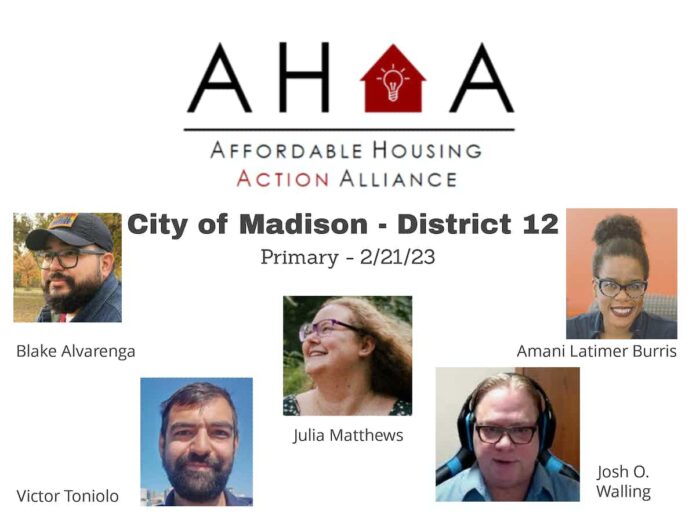While all the candidates say that affordable housing is a priority, read here to find out what they say they will do about it!
District 12 has a primary on Tuesday, February 21, 2022. Here’s a map of district 12, here’s where you find out where to vote. And here’s the candidates on affordable housing! All candidate answers can be found here.
- The City of Madison continues to put money into affordable housing, but we can’t develop affordable housing fast enough or in a large enough quantity for people with incomes that are at or below 30% of the Area Median Income (AMI). What new ideas would you bring to the table to assist us in getting more affordable housing for people at or below 30% AMI?
 Blake Alvarenga
Blake Alvarenga
There is no new magic answer to housing, as an alder I will vote on new developments and will vote against items that will slow/stop housing. The best thing we can do is have more development and make sure we are offering as much assistance as possible.
Amani Latimer Burris
Did not answer the questions.
 Julia Matthews
Julia Matthews
The City should pursue any and all avenues to guarantee that more <=30% AMI units are developed to meet demand. This could potentially include more stringent requirements tied to use of city funds and/or setting aside money specifically for building those units. Additionally, the City should develop longer-term contracts for use of city funds so on a project-by-project basis more units have to be converted to below 30% over time after initial construction costs are recouped. Also the city should invest specifically in public housing or working with The Madison Area Community Land Trust, cooperative housing, etc, which offer affordable housing options.
Victor Toniolo
The word “affordable” is meaningless if it’s not affordable for all. I would expand the CDD affordable housing fund and place higher minimums on the number of units available to those making 30% AMI or less. I would also force landlords to accept housing choice vouchers (section 8) so that those lucky enough to receive them can actually find a suitable unit.
 Josh O. Walling
Josh O. Walling
Did not answer the questions
- Much of the affordable housing that is currently being built in our area is Section 42 tax credit housing in which the Area Median Income (AMI) is used to determine rent amounts. And because the AMI is so high in Dane County the rent for many of the units ends up being close to market rate. What can we do to make sure that the affordable housing we build ends up being affordable enough to reach lower incomes? Should Section 42 developments that receive city funding be required to have more units affordable for those at or below 30% of AMI than they do now?
 Blake Alvarenga
Blake Alvarenga
The answer is more development at the local level. There are a lot of tools that can be leveraged to help those that fall below 30% of AMI, but locally all we can do is affect the market and give assistance where we can. We need to continue to press state and federal lawmakers to raise the minimum wage and go after anti-labor practices.
Amani Latimer Burris
Did not answer the questions.
 Julia Matthews
Julia Matthews
Yes, we should require more units for those at or below 30% AMI. For the current AMI of Dane County, even someone being paid $15-$19/hour for a guaranteed 40 hours of work is below 30%, let alone someone working a minimum wage job. Housing options need to exist for everyone who lives here regardless of their income!
Victor Toniolo
We need to build more housing, period. Madison can at least slow the rate of market increases by allowing supply to meet demand. I read multiple housing reports and understand that there are large housing deficits both at the low and high ends, so development needs to focus on actual high end units (not cheap “luxury” apartments) and units that are affordable for all.
 Josh O. Walling
Josh O. Walling
Did not answer the questions
- We need more nonprofit developers who are willing to build affordable housing and keep it affordable for longer periods of time. What can we do to get more nonprofit developers in our community and support their growth and success?
 Blake Alvarenga
Blake Alvarenga
I don’t know. I hope AHAA and others can help educate me on ways to leverage non-profit developers. I’ve done a lot of reading and research on housing, however non-profit developers is not a topic I’ve seen addressed.
Amani Latimer Burris
Did not answer the questions.
 Julia Matthews
Julia Matthews
The City could have a liaison or offer an education series to help nonprofits navigate the existing funding requirements, city opportunities, and other federal and state programs geared towards affordable housing. The City should be trying to facilitate the education necessary to do this work, but that is not enough. They also need to be facilitating collaboration between existing nonprofits so they can more effectively work together and make sure that different populations are all being served!
Victor Toniolo
Madison can offer additional tax incentives to nonprofit development. We can choose to work with nonprofit developers to redevelop city owned properties, and favor nonprofit developers when entering other public-private partnerships. The city can also encourage more collaboration between many of the Madison area nonprofit organizations and combine funding
 Josh O. Walling
Josh O. Walling
Did not answer the questions
- Most affordable housing is only affordable for a period of 40 years or less, meaning our investment in affordable units is lost after a set time. Please discuss any ideas that you have for keeping affordable housing in Madison affordable long-term?
 Blake Alvarenga
Blake Alvarenga
I am concerned with the next 20 years, I spend most of my energy resolving the problems we have today and tomorrow. I think it’s extremely difficult to predict the housing market 40 years from now, but over the next decade Madison is expected to grow by 50k-100k people, and we need to plan for that today.
Amani Latimer Burris
Did not answer the questions.
 Julia Matthews
Julia Matthews
The city should build in more requirements to the funding it provides that require a longer period of units being affordable, and maybe even include more units being converted to affordable over time (as mentioned in a previous answer). I want to be upfront that I know current state law prohibits universal rent control at the city level. So I can’t say for sure if this would be possible, however it is worth asking if the city could on a project-by-project basis build rent increase caps into the contracts when providing city funds. If the state were to change, I would be supportive of pursuing all possibilities for limiting outrageous rent increases as well as artificially inflated market rates.
Victor Toniolo
More housing makes all housing more affordable in the long term. Higher density increases the city’s property tax income and allows us to better fund affordable projects and many other city services. I am happy with TOD but more upzoning can be done, especially in district 12.
 Josh O. Walling
Josh O. Walling
Did not answer the questions
- Tenants in the city and county have had access over the last couple of years to eviction prevention and security deposit funds thanks to the federal government’s COVID relief funding. These funds – the CORE program – likely will end in 2023. Do you think the city should prioritize providing more funds once the COVID money ends and if so, please give some ideas of sources of funding?
 Blake Alvarenga
Blake Alvarenga
The city of Madison should provide what funds the budget can provide, however it may not be feasible. I don’t have any special solutions for new sources of funding, however I think Madison should always strive to be more efficient with its budget to provide additional assistance to the people who live here.
Amani Latimer Burris
Did not answer the questions.
 Julia Matthews
Julia Matthews
The city needs to start preparing now to have additional funds and services for families who are struggling to make ends meet. Continuing to address the housing crisis will help by providing more housing options to address the issue of supply and getting rents back to a more reasonable rate for people to be able to afford, but that will take a lot of time to truly have an impact. We explicitly need to look to the examples of Seattle, Portland, Austin, and San Francisco to learn from their successes and failures. There is still time to change course. While the specifics at the state level are obviously different, Portland has previously directed money from hotel room tax to affordable housing. If people who work in the service industry are not able to live in Madison (or even the surrounding area given rising costs across Dane County), in addition to many other things, tourism in Madison would grind to a halt. So it could be said that having housing options suitable to all people is essential to tourism in Madison. Obviously having housing for everyone is also essential to Madison’s overall high quality of life.
Victor Toniolo
I have helped multiple tenants use the CORE program. I believe the city should continue to offer emergency rental assistance in some form, but acknowledge that since COVID is no longer affecting jobs, it makes sense to end this specific program. The city would collect a lot more tax dollars by allowing more high end development.
 Josh O. Walling
Josh O. Walling
Did not answer the questions
- Are there any changes that the city could make – zoning requirements, paperwork, etc. – that could make affordable housing development and operation easier and more attractive to nonprofits and businesses, and also less burdensome for tenants who have to complete a lot of paperwork and meet reporting requirements?
 Blake Alvarenga
Blake Alvarenga
The city should be aggressive with loosening zoning requirements, the affordable housing shortage is having a strong impact on the people who live and work in Madison, and it will continue to get worse unless more housing development is done. Reporting requirements should always be reevaluated, reviewing eligibility is not a cheap endeavor and should always be minimized to the size of those taking advantage of the program.
Amani Latimer Burris
Did not answer the questions.
 Julia Matthews
Julia Matthews
“Finally, reforming zoning codes to shift from exclusionary to inclusionary provisions is one of the most impactful actions a state or local government can take to make housing more affordable for their communities, and, once implemented, requires minimal government involvement. Zoning ordinances have been used in states and localities across the country to exclude low-income and people of color by only permitting more expensive forms of housing to be constructed – three quarters of all land in American cities is zoned only for single-family housing, and many areas have lot size minimums, setback requirements, prohibitions on accessory dwelling units, and similar restrictive policies.” (Policy Approaches for Improving Housing Affordability and Availability, Brianne Schell:https://www.networkforphl.org/news-insights/policy-approaches-for-improving-housing-affordability-and-availability/)
I think this quote best summarizes the real power the city has with regards to zoning. The city needs to continue incorporating more inclusive zoning and expand that effort citywide to remove some of the existing burden for even existing homeowners to develop additional housing on their properties. Currently, the main group of people who have the time, resources, and ability to build when their projects require zoning changes are the biggest developers. So removing this burden enables smaller groups and nonprofits to participate in developing housing in the city. When it comes to tenant burdens, I think the city should attempt to reduce burden either by lessening requirements or helping facilitate assistance for completion of required reporting.
Victor Toniolo
Yes! The city is finally realizing that upzoning is needed to combat rising prices, and we can do more than the TOD. The city can do more outreach to solicit opinions of would-be residents to counter longtime property owners’ opposition to affordable developments. I would introduce anti discrimination legislation that explicitly allows a tenant to wait until after a lease is signed to disclose vouchers or other housing assistance they recieve. I’d also include service animals and ESAs in that ordinance.
 Josh O. Walling
Josh O. Walling
Did not answer the questions





